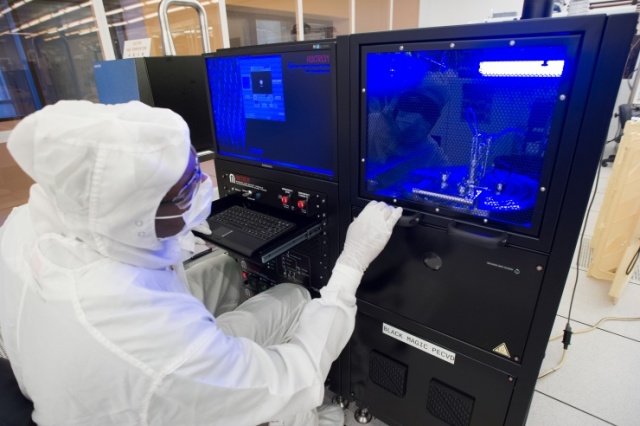To advance nanoscale science, engineering and technology research, the National Science Foundation (NSF) will provide a total of $81 million over five years to support 16 user facility sites and a coordinating office as part of a new National Nanotechnology Coordinated Infrastructure (NNCI).
 This Black Magic CNT Growth System in the Institute for Electronics and Nanotechnology shared user laboratory is utilized to grow single, multi-wall, and super-growth carbon nanotubes.
This Black Magic CNT Growth System in the Institute for Electronics and Nanotechnology shared user laboratory is utilized to grow single, multi-wall, and super-growth carbon nanotubes.
The NNCI sites will provide researchers from academia, small and large companies, and government with access to university user facilities with leading-edge fabrication and characterization tools, instrumentation, and expertise within all disciplines of nanoscale science, engineering and technology.
The NNCI framework builds on the National Nanotechnology Infrastructure Network (NNIN), which enabled major discoveries, innovations and contributions to education and commerce for more than 10 years. The NNCI awards are for up to five years and range from $500,000 to $1.6 million each per year. The 16 NNCI sites are located in 15 states and involve 27 universities.
As part of the NNCI, the Georgia Institute of Technology and the Joint School of Nanoscience and Nanoengineering (JSNN) -- an academic collaboration between North Carolina A&T State University (NCA&T) and the University of North Carolina at Greensboro (UNCG) -- will receive $1.6 million per year to form the Southeastern Nanotechnology Infrastructure Corridor (SENIC) to provide nanotechnology shared user facilities, educational outreach, and social impact awareness. These efforts will be led by the Institute for Electronics and Nanotechnology (IEN) at Georgia Tech.
“Through the NNCI, the Southeastern Nanotechnology Infrastructure Corridor combines the infrastructure strengths of both Georgia Tech and the JSNN to provide our users access to one of the largest and most modern nano-fabrication and nano-characterization tool sets in the country,” said Oliver Brand, executive director of IEN and director of SENIC. “This partnership provides particular strength in the ability to connect nanomaterials and devices to full packaged systems. In providing users with access to more than 230 nanotechnology fabrication and characterization tools, SENIC offers both top-down and bottom-up approaches for nanofabrication through nanoscale patterning, as well as nanomaterials synthesis and additive processing.”
Beyond support for nanotechnology research and development, SENIC partners will support undergraduate and graduate students, in collaboration with two-year technical colleges. The goal is to produce science and technology professionals from diverse backgrounds to meet the workforce demands of the 21st century.
SENIC will also provide public outreach activities, with hands-on classroom activities and interactive facility tours designed to encourage K-12 students to join the STEM pipeline. With its educational program, SENIC will provide education on the social and ethical implications associated with the role that nanoscale science and engineering will contribute to solving societal, environmental and economic challenges.
Nanoscale science and engineering requires the use of complex and expensive tools, along with companion facilities and support from those with highly specialized training in the operation and application of such tools and laboratories. To meet these needs, Georgia Tech has emphasized the growth of shared-user facilities like SENIC.
"With this NSF support, we will be able to provide external users from academia and industry with the environment, tools, and the excellent staff support to get them familiar with nanotechnology capabilities and successfully apply nanotechnology to solve their challenges and enhance their products,” said Stephen E. Cross, Georgia Tech’s executive vice president for research.
The new NNCI is part of the NSF’s commitment to providing infrastructure support for nanoscale research.
“NSF’s long-standing investments in nanotechnology infrastructure have helped the research community to make great progress by making research facilities available,” said Pramod Khargonekar, NSF’s assistant director for engineering. “NNCI will serve as a nationwide backbone for nanoscale research, which will lead to continuing innovations and economic and societal benefits.”
In addition to Brand, who is also a professor in the Georgia Tech School of Electrical and Computer Engineering, SENIC leadership will also be provided by Daniel Herr, professor and nanoscience department chair at JSNN, who will serve as co-director.
For more information about IEN and JSNN capabilities and how to access equipment and facilities, please see each of the following:
Georgia Tech’s IEN: http://cleanroom.ien.gatech.edu/
JSNN: http://jsnn.ncat.uncg.edu/facility/